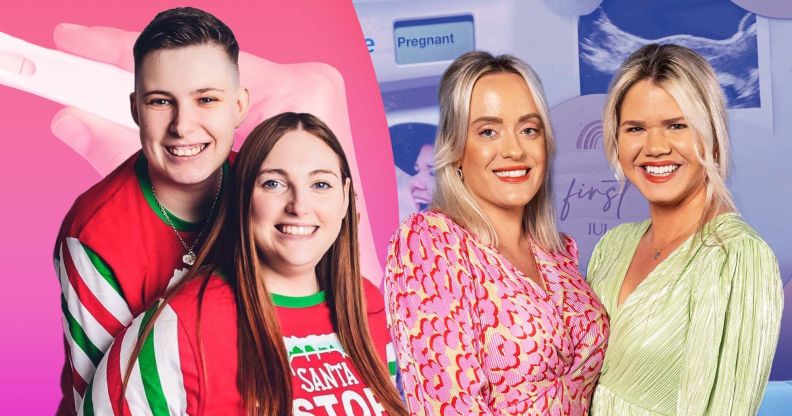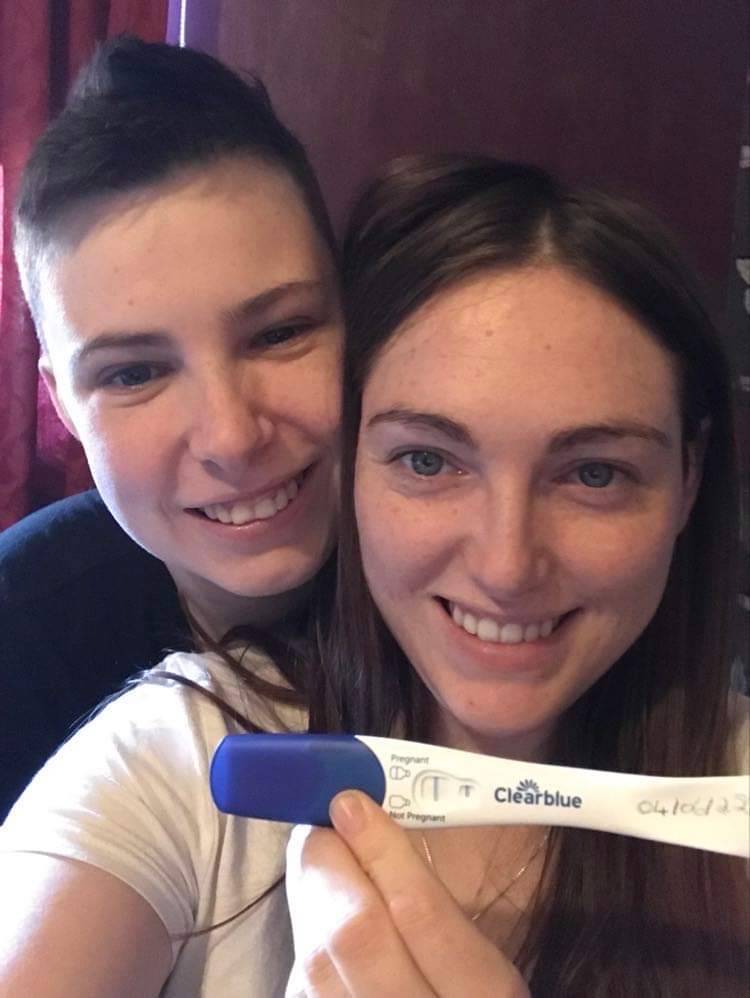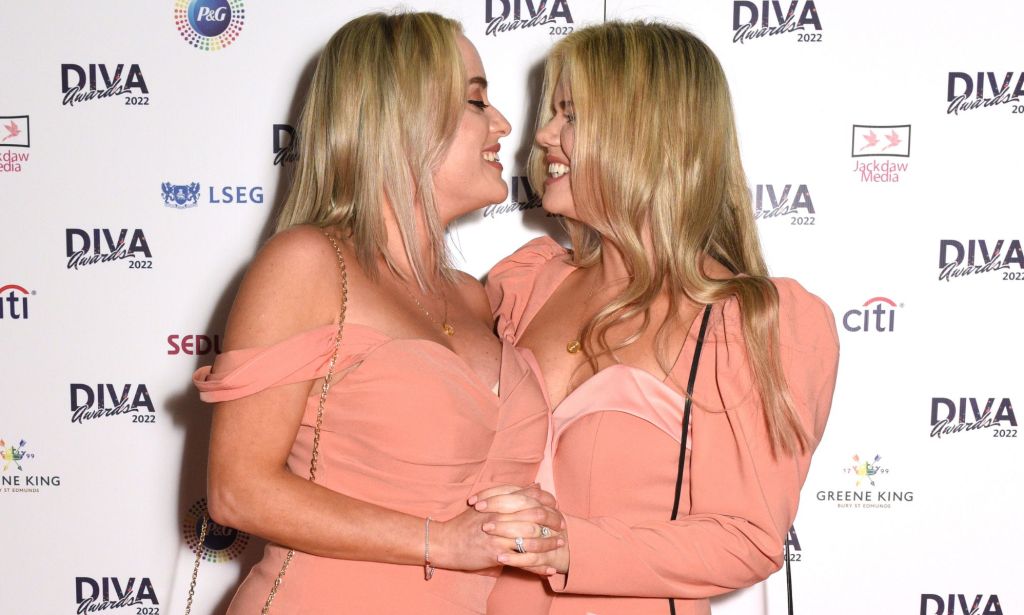Same-sex couples feel like ‘second class citizens’ and face ‘gay tax’ trying to start families

Megan and Whitney Bacon-Evans and Danielle and Natalie are among the queer couples who have faced a ‘gay tax’ while embarking on their fertility journeys in the UK. (Getty/Danielle and Natalie/Instagram/@whatwegandidnext)
Megan and Whitney Bacon-Evans and Danielle and Natalie are among the queer couples who have faced a 'gay tax' while embarking on their fertility journeys in the UK. (Getty/Danielle and Natalie/Instagram/@whatwegandidnext)
For Whitney and Megan Bacon-Evans, having a family was always in the cards. But the influencers, like other queer couples, say they never imagined the “gay tax” they’d face on their fertility journey.
The couple, who have been together for almost 15 years, knew within six months that they wanted to have children together one day – even picking out names for their future kids.
Whitney tells PinkNews that the couple was “really in the dark” because there were no examples of families that looked like theirs who accessed fertility treatment through the NHS. Then, when they finally got an NHS consultation, they were given the wrong information.
The couple, known collectively online as ‘Wegan’, were told they needed to go through at least six cycles of intrauterine insemination (IUI) artificial insemination in the clinic before they are eligible for NHS in vitro fertilisation (IVF).
But they later found out that it was actually 12 cycles – which cost upwards of £1,600 for each cycle.
“They say six of which had to be at a clinic, but you can’t do home insemination with sperm from a sperm bank so 12 of which would have to be IUI in the clinic,” Megan says.
“So you’re looking at around £25,000 to £50,000 potentially depending on tests, the cost of sperm – which is expensive as well – let alone anything else that goes with it.
“We were just really shocked because we’re like, ‘Hang on a minute, there’s clearly a big, unfair financial burden that’s been placed on same-sex female couples in this situation because the criteria for a cis, heterosexual is two years of unprotected sex.’
“So while we know that it takes its toll and it’s not a fun process for anyone to go through trying to conceive, there’s no evidence required, and there’s no financial cost.
“There’s just a clear divide where there’s a gay tax, if you will, being put on lesbian couples.”
Whitney says she felt like a “second class citizen” and that the couple weren’t “worthy of having a family” as a result of this unequal treatment.
So, in 2021, they launched a landmark judicial review into these hurdles, campaigning for fertility equality across the UK.
While sharing their story and campaign online, Megan and Whitney heard from other couples facing this challenging situation, with one saying they spent “£100,000 but still didn’t meet the criteria” from the NHS.
Then, in July, they claimed a “victory” in their case when their local ICB agreed to give queer couples the same access to fertility treatment.
Whitney says the couple were hoping that their visibility, awareness of their campaign and the legal action would be a “catalyst for positive change and hopefully set precedent across all the ICBs in England”.
“We kind of knew doing this that it wasn’t going to benefit us because we were past the age anyway by the time anything kind of came into effect,” she says.
“It was something we really wanted to do because we have a platform, and we came across these issues, these barriers and we really wanted to make change because someone’s gonna have to do it.
“If someone didn’t make change for gay marriage, we wouldn’t be able to get married. And [this] didn’t sit well with us.”
For some couples, the NHS isn’t an option
Natalie and Danielle say that using the NHS “wasn’t an option” for them because Danielle had a child from a previous relationship. The healthcare service wouldn’t cover their fertility treatments unless Natalie chose to carry their baby, which was not her preference.
So the couple decided to go down the private route through TFP Fertility UK, one of the UK’s largest IVF providers and fertility specialists. When they found TFP, they felt like “this is the thing [they] wanted” and were happy with the way both parties were being treated in the conversation around pregnancy.
“I think what the NHS couldn’t offer us was me feeling included,” Natalie says.
“With TFP, they could offer us where it was like I’m a part of this.
“We are getting pregnant – not just Danielle’s getting pregnant.
“It made me feel like, ‘Okay, so I’m actively wanting to be a mum, being told your a mum and feeling like a mum.’”
Danielle believes it can be hard for the non-carrying parent to feel included in the journey because she could feel the baby move and how her body was “responding to things”. But Natalie just had to “go on whatever [she] was telling her”.
Natalie adds they “tried so hard to get pregnant”, and the attempts that “didn’t work” were “really difficult on the pair.

They know how hard it is for other queer couples to be told “it’s going to be years before anything can actually happen” on the NHS because embarking on a fertility journey is “not a snap decision that people make”.
But they implored other couples to “be picky” and “don’t feel rushed” when it comes to what system or organisation they utilise on their fertility journey.
“When you’re in that clinic, when you get phone calls with good or bad news, when you go through tests, you need to know that the people who are there are going to be understanding; they’re going to be compassionate; they’re going to treat us both with equal respect; they’re going to understand that you are a team and we are both mums or you’re both parents or whatever level you want to give yourself,” Danielle says.
Government plan to tackle financial burden on queer couples
In its women’s health strategy, published in July 2023, the government said it was “committed to improving access to IVF for female same-sex couples by removing additional financial barriers”. But said ICBs are “responsible for applying this locally”.
Maria Caulfield, parliamentary under secretary for women’s health strategy, said in May that the expected removal of this financial burden when accessing IVF treatment should “take effect during 2023”.
However, the government still has not made a formal announcement on whether this would happen in the coming months.

Whitney and Megan Bacon-Evans, who have spoken to parliament about the toll this discriminatory policy had on them, say it’s been a “long process” and a “lot of stress behind the scenes” during their campaign.
But they were hopeful that the government’s promise would come to fruition soon.
“We’ve had a lot of people panicking because the women’s health strategy is a 10-year plan,” Megan says.
“But we have heard from multiple sources, the government has stated multiple times that it is going to be happening in 2023, but probably by the end of 2023.”
“And then what that means, in reality, we’re still waiting to find out because I think they have said that it’s up to the ICBs as to when it is rolled out, which is really frustrating, because you want me to know me as of like 2024.”
“We just want basically the government to stick with what they said,” Whitney adds.
“Instead of making it a suggestion ‘this is what you should do’, make it mandatory because that would really change the lives of so many people.”

